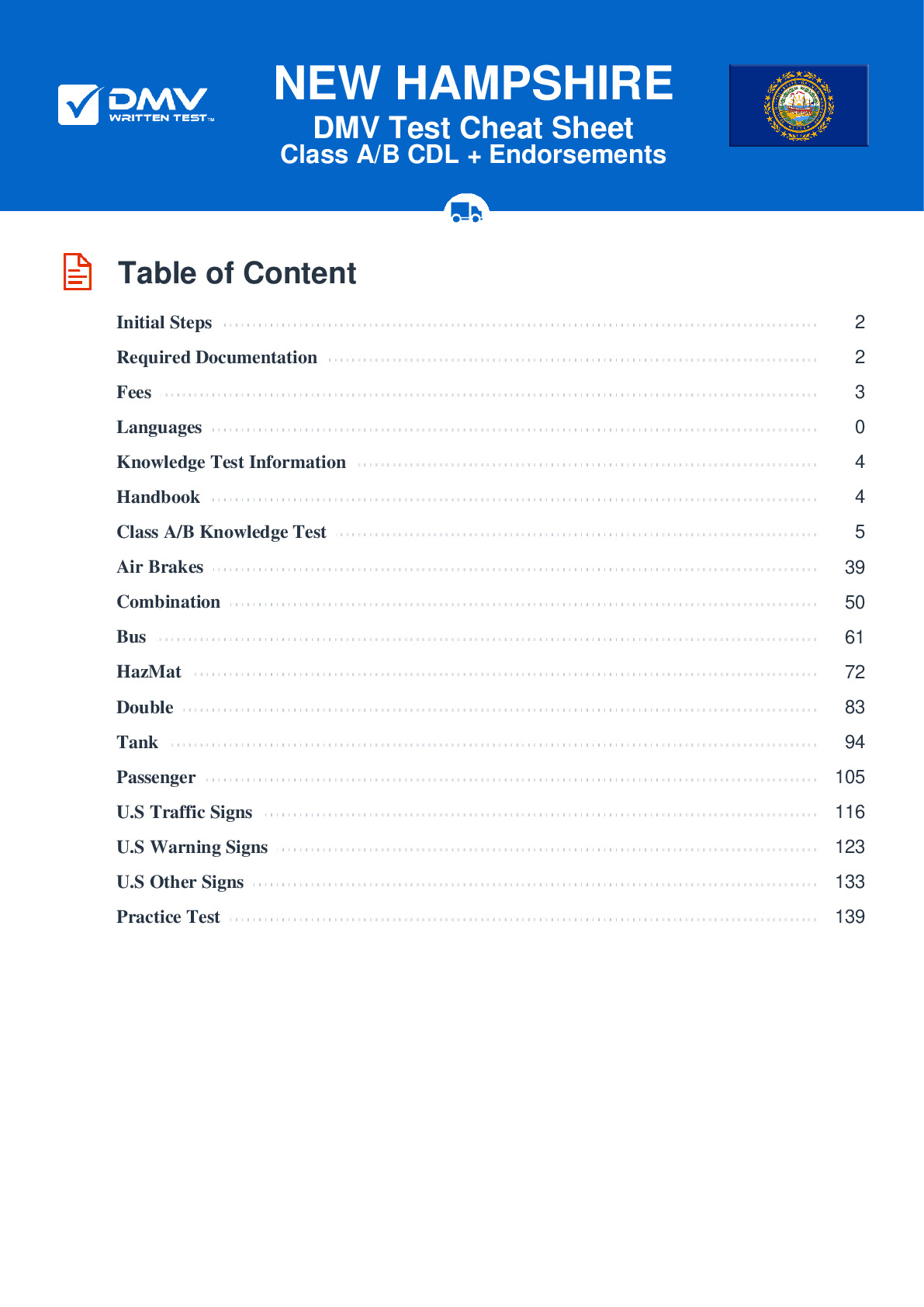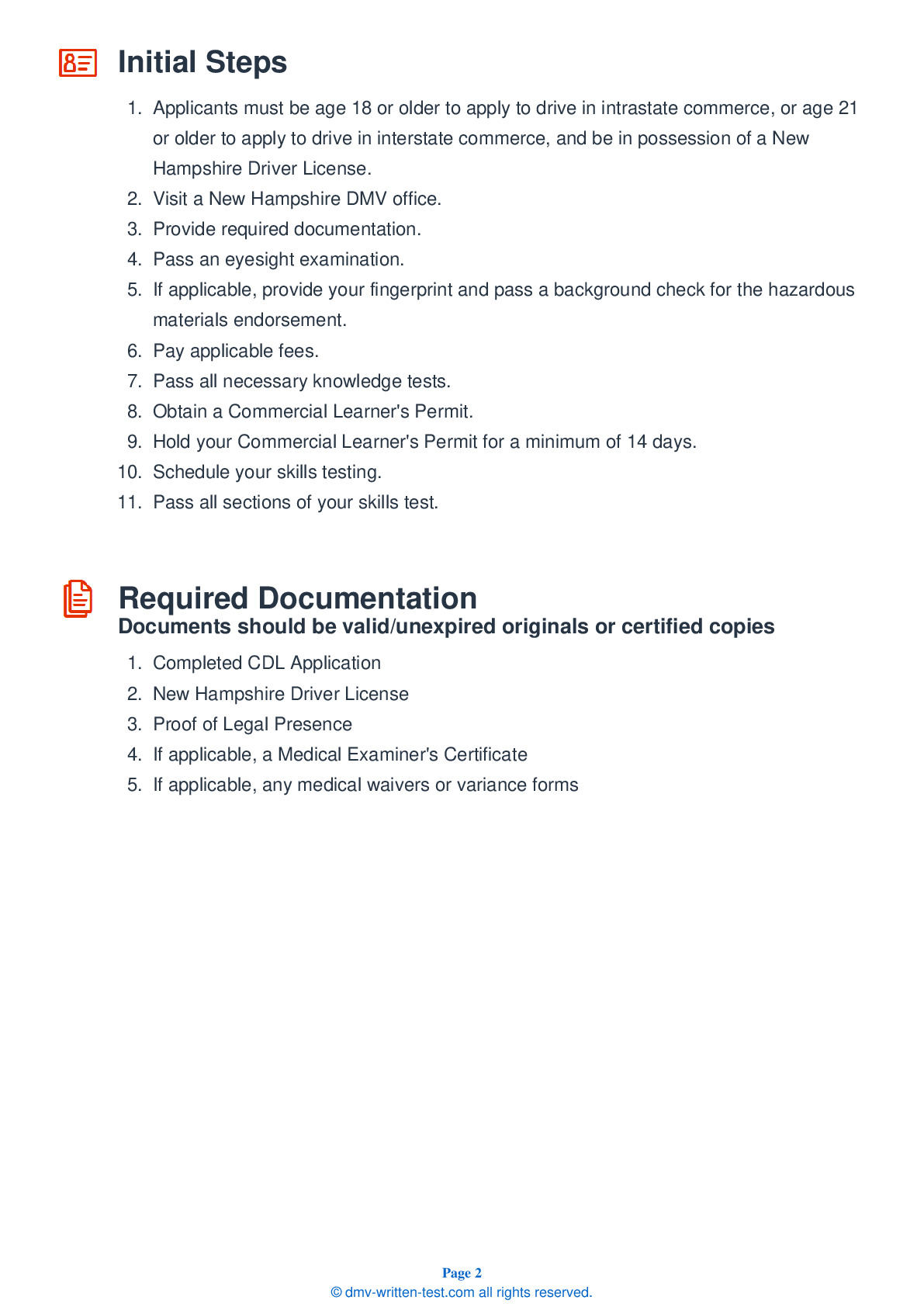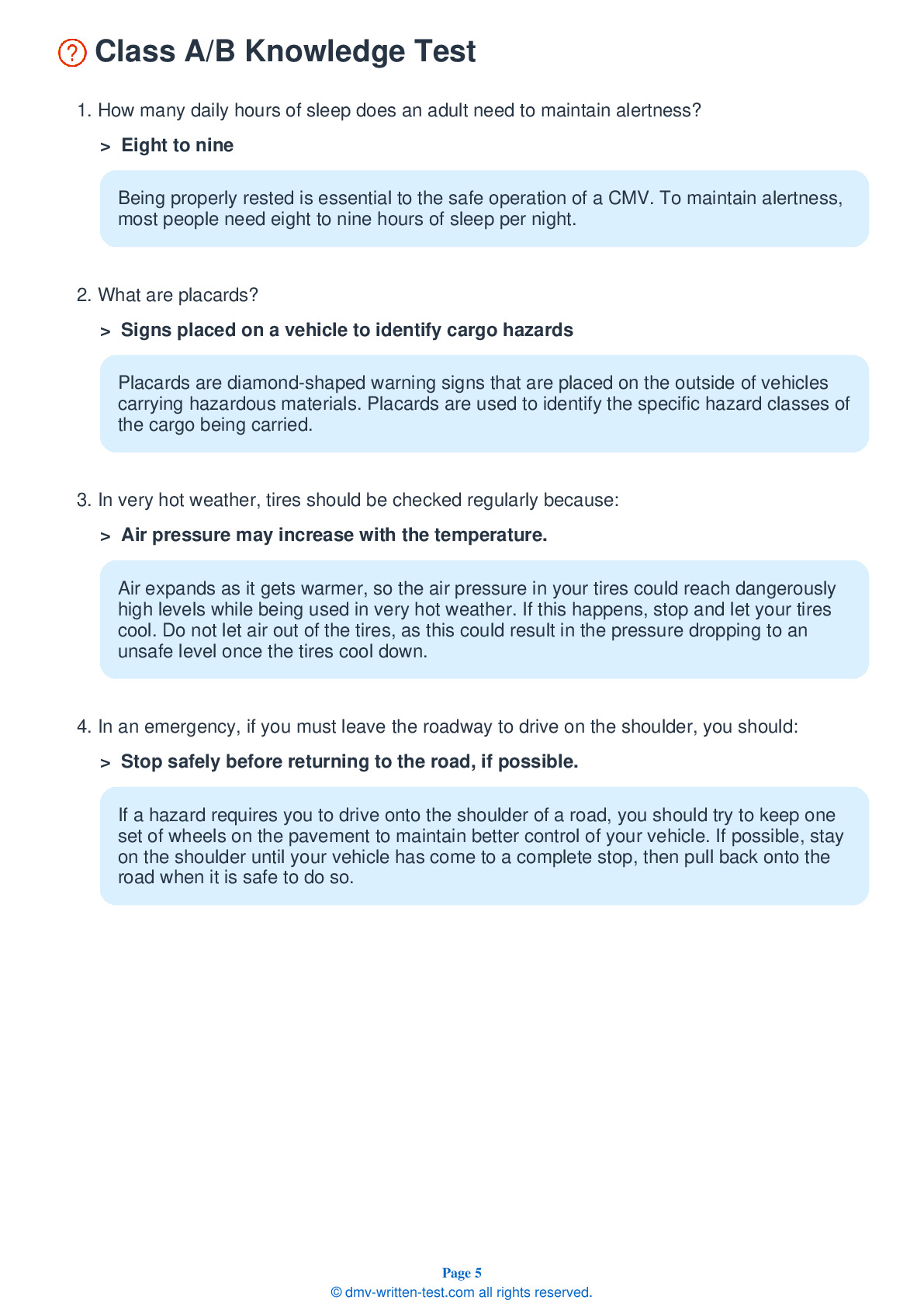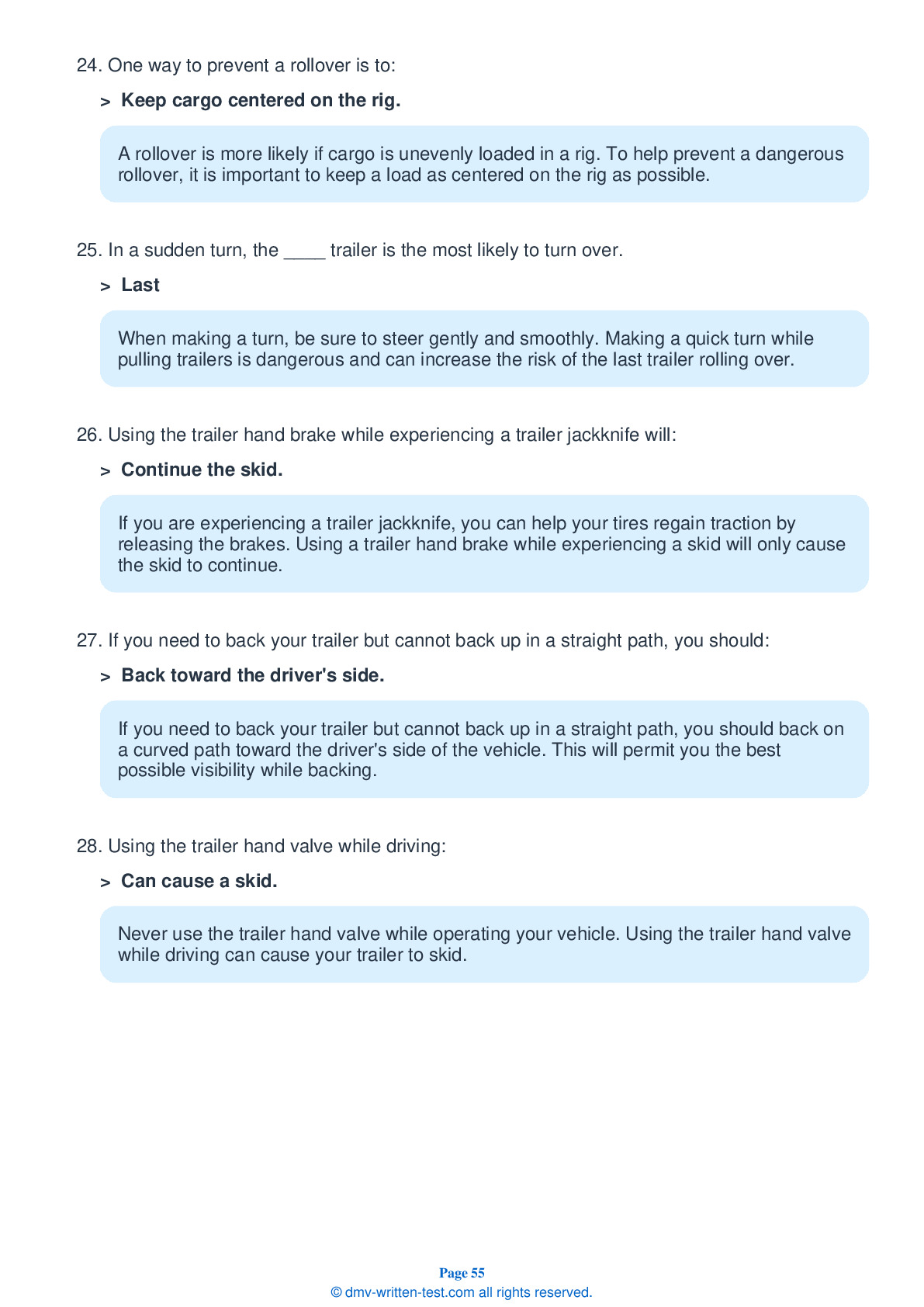Double
This endorsement is required if the driver will pull two or three trailers. To receive this endorsement, applicants must pass a test. The test consists of 20 multiple choice questions. To pass, the applicant must answer at least 16 questions correctly. Each question has four possible answer choices. Test questions come from the New Hampshire CDL Driver’s Guide. Questions come from chapters covering: Driving Safely, Air Brakes (if applicable), Combination Vehicles and Doubles and Triples. The Double/Triple endorsement can be used with the Class A CDL.
Number of Question
Passing Score
15. Braking mechanisms are located inside:
Explanation
Drum brakes are attached to the wheels and located on the axles of a vehicle. The braking mechanisms that cause the vehicle to stop can be found inside of a drum brake.
16. Eating while driving is:
Explanation
Smoking, eating, or drinking are distracting activities and should be avoided while you are driving. Instead, plan ahead and allow yourself time to stop to eat when making a lengthy trip.
17. What can happen if the air pressure gets too low in an air brake system?
Explanation
Pressing and releasing the brake pedal unnecessarily can let air out of the braking system faster than the compressor can replace it. Air brakes may cease to work effectively if the pressure becomes too low.
18. How long should it take for oil pressure to reach a normal level when starting a vehicle?
Explanation
After starting a vehicle's engine, the oil pressure should come up to a normal level within seconds. Do not operate a vehicle if it has oil pressure that is low, dropping, or fluctuating.
19. When it is difficult to see other vehicles, such as at dawn or dusk, you should:
Explanation
When driving at dawn, at dusk, or in inclement weather, you should use your headlights on their low beam setting to increase your visibility.
20. If a tire fails, the driver should:
Explanation
If a tire fails, braking could cause a loss of control. Unless braking is necessary to avoid a hazard, you should stay off the brakes until your vehicle has slowed considerably. Only then should you brake very gently, pull off the road, and stop.
Frequently Asked Questions
To obtain a CDL Doubles/Triples endorsement in New Hampshire, follow these steps:
1. Obtain a New Hampshire Commercial Driver's License (CDL).
To obtain a CDL, you must be at least 18 years old and have a valid driver's license. You will also need to pass a written knowledge test and a skills test.
2. Meet the eligibility requirements.
To be eligible for the Doubles/Triples endorsement, you must have a valid CDL and pass a written test on the knowledge of safe driving practices for pulling double/triple trailers.
3. Study for the written test.
You can find study materials on the New Hampshire Department of Motor Vehicles (DMV) website, including the Commercial Driver License Manual.
4. Schedule an appointment to take the written test.
You can schedule an appointment to take the written test at any New Hampshire DMV office.
5. Take and pass the written test.
You will need to answer at least 80% of the questions correctly to pass.
6. Pay the required fee.
There is a fee for adding the Doubles/Triples endorsement to your CDL.
7. Receive your endorsement.
Once you have passed the written test and paid the fee, your Doubles/Triples endorsement will be added to your CDL. You can then legally drive double/triple trailers in New Hampshire.
1. Obtain a New Hampshire Commercial Driver's License (CDL).
To obtain a CDL, you must be at least 18 years old and have a valid driver's license. You will also need to pass a written knowledge test and a skills test.
2. Meet the eligibility requirements.
To be eligible for the Doubles/Triples endorsement, you must have a valid CDL and pass a written test on the knowledge of safe driving practices for pulling double/triple trailers.
3. Study for the written test.
You can find study materials on the New Hampshire Department of Motor Vehicles (DMV) website, including the Commercial Driver License Manual.
4. Schedule an appointment to take the written test.
You can schedule an appointment to take the written test at any New Hampshire DMV office.
5. Take and pass the written test.
You will need to answer at least 80% of the questions correctly to pass.
6. Pay the required fee.
There is a fee for adding the Doubles/Triples endorsement to your CDL.
7. Receive your endorsement.
Once you have passed the written test and paid the fee, your Doubles/Triples endorsement will be added to your CDL. You can then legally drive double/triple trailers in New Hampshire.
To get a CDL Doubles/Triples license in New Hampshire, you must meet the following requirements:
1. Be at least 18 years old.
You must be at least 18 years old to obtain a CDL Doubles/Triples license. However, you will be restricted to driving within the state of New Hampshire only until you turn 21.
2. Have a valid New Hampshire CDL.
You must already have a valid New Hampshire Commercial Driver's License (CDL) to apply for the Doubles/Triples endorsement.
3. Pass a written test.
You must pass a written test on the knowledge of safe driving practices for pulling double/triple trailers. This test includes information about coupling and uncoupling trailers, inspecting multiple trailers, and driving safely with multiple trailers.
4. Pay the required fee.
There is a fee for adding the Doubles/Triples endorsement to your CDL.
5. Meet specific medical requirements.
You must meet specific medical requirements, including having good vision and hearing, and being in good physical condition.
6. Pass a background check.
You will need to pass a background check, which includes a criminal history check and a driving record check.
Note that if you already have a CDL with certain endorsements such as Hazmat or Tanker, you may be required to obtain those endorsements again when you apply for the Doubles/Triples endorsement.
1. Be at least 18 years old.
You must be at least 18 years old to obtain a CDL Doubles/Triples license. However, you will be restricted to driving within the state of New Hampshire only until you turn 21.
2. Have a valid New Hampshire CDL.
You must already have a valid New Hampshire Commercial Driver's License (CDL) to apply for the Doubles/Triples endorsement.
3. Pass a written test.
You must pass a written test on the knowledge of safe driving practices for pulling double/triple trailers. This test includes information about coupling and uncoupling trailers, inspecting multiple trailers, and driving safely with multiple trailers.
4. Pay the required fee.
There is a fee for adding the Doubles/Triples endorsement to your CDL.
5. Meet specific medical requirements.
You must meet specific medical requirements, including having good vision and hearing, and being in good physical condition.
6. Pass a background check.
You will need to pass a background check, which includes a criminal history check and a driving record check.
Note that if you already have a CDL with certain endorsements such as Hazmat or Tanker, you may be required to obtain those endorsements again when you apply for the Doubles/Triples endorsement.
Yes, you may need specific experience or training to obtain a CDL Doubles/Triples endorsement in New Hampshire.
Firstly, you must already hold a valid New Hampshire Commercial Driver's License (CDL) to apply for the Doubles/Triples endorsement.
Additionally, the Federal Motor Carrier Safety Administration (FMCSA) requires that drivers seeking a Doubles/Triples endorsement must have experience operating commercial motor vehicles with single trailers for at least one year.
Finally, it's recommended that you complete a training program that includes instruction on operating double/triple trailers before taking the written test. This training can be obtained through a CDL driving school or through an employer-sponsored training program.
In summary, while there is no specific training requirement to obtain a CDL Doubles/Triples endorsement in New Hampshire, you must have experience driving commercial motor vehicles with single trailers and it is recommended that you receive training on operating double/triple trailers before taking the written test.
Firstly, you must already hold a valid New Hampshire Commercial Driver's License (CDL) to apply for the Doubles/Triples endorsement.
Additionally, the Federal Motor Carrier Safety Administration (FMCSA) requires that drivers seeking a Doubles/Triples endorsement must have experience operating commercial motor vehicles with single trailers for at least one year.
Finally, it's recommended that you complete a training program that includes instruction on operating double/triple trailers before taking the written test. This training can be obtained through a CDL driving school or through an employer-sponsored training program.
In summary, while there is no specific training requirement to obtain a CDL Doubles/Triples endorsement in New Hampshire, you must have experience driving commercial motor vehicles with single trailers and it is recommended that you receive training on operating double/triple trailers before taking the written test.
Yes, there is an additional written test that you must pass to obtain a CDL Doubles/Triples endorsement in New Hampshire.
The test covers knowledge specific to driving double/triple trailers, including how to inspect and couple/uncouple multiple trailers, and how to safely operate a combination vehicle with multiple trailers.
You will need to study the New Hampshire Commercial Driver License Manual, which includes information on all CDL endorsements, including the Doubles/Triples endorsement.
Once you pass the written test, you will be issued a new CDL with the Doubles/Triples endorsement added.
It's important to note that while passing the written test is required to obtain the endorsement, it's also important to receive practical training on how to operate double/triple trailers before driving them on the road. You may want to consider enrolling in a training program or receiving on-the-job training from your employer to ensure that you are fully prepared for this type of driving.
The test covers knowledge specific to driving double/triple trailers, including how to inspect and couple/uncouple multiple trailers, and how to safely operate a combination vehicle with multiple trailers.
You will need to study the New Hampshire Commercial Driver License Manual, which includes information on all CDL endorsements, including the Doubles/Triples endorsement.
Once you pass the written test, you will be issued a new CDL with the Doubles/Triples endorsement added.
It's important to note that while passing the written test is required to obtain the endorsement, it's also important to receive practical training on how to operate double/triple trailers before driving them on the road. You may want to consider enrolling in a training program or receiving on-the-job training from your employer to ensure that you are fully prepared for this type of driving.
In New Hampshire, the CDL Doubles/Triples endorsement test consists of both a written test and a skills test.
To pass the skills test and obtain the endorsement, you will need to demonstrate proficiency in several maneuvers, including:
1. Inspecting the vehicle: You will need to demonstrate that you know how to perform a thorough inspection of the double/triple trailer vehicle before driving it. This includes checking the coupling and uncoupling of the trailers, checking the air brake system, and checking the lights.
2. Coupling and uncoupling: You will need to show that you can properly couple and uncouple the trailers, including attaching and detaching air lines, electrical lines, safety chains, and kingpins.
3. Straight line backing: You will need to demonstrate your ability to back up a double/triple trailer in a straight line for at least 100 feet.
4. Off-set backing: You will need to show that you can back up a double/triple trailer into a space that is offset to one side.
5. Alley Docking: You will need to demonstrate your ability to back up a double/triple trailer into an alley dock.
6. Maintaining control: You will need to demonstrate that you can safely operate a double/triple trailer on the road while maintaining control, including making turns, changing lanes, and stopping.
It's important to note that passing the skills test requires not only knowledge of these maneuvers but also practical experience in operating double/triple trailers. Consider seeking training from a CDL driving school or employer-sponsored training program to ensure you are fully prepared for the skills test.
To pass the skills test and obtain the endorsement, you will need to demonstrate proficiency in several maneuvers, including:
1. Inspecting the vehicle: You will need to demonstrate that you know how to perform a thorough inspection of the double/triple trailer vehicle before driving it. This includes checking the coupling and uncoupling of the trailers, checking the air brake system, and checking the lights.
2. Coupling and uncoupling: You will need to show that you can properly couple and uncouple the trailers, including attaching and detaching air lines, electrical lines, safety chains, and kingpins.
3. Straight line backing: You will need to demonstrate your ability to back up a double/triple trailer in a straight line for at least 100 feet.
4. Off-set backing: You will need to show that you can back up a double/triple trailer into a space that is offset to one side.
5. Alley Docking: You will need to demonstrate your ability to back up a double/triple trailer into an alley dock.
6. Maintaining control: You will need to demonstrate that you can safely operate a double/triple trailer on the road while maintaining control, including making turns, changing lanes, and stopping.
It's important to note that passing the skills test requires not only knowledge of these maneuvers but also practical experience in operating double/triple trailers. Consider seeking training from a CDL driving school or employer-sponsored training program to ensure you are fully prepared for the skills test.
No, you cannot operate double/triple trailers without a CDL Doubles/Triples endorsement in New Hampshire.
A CDL with a Doubles/Triples endorsement is required for drivers who operate vehicles with multiple trailers that have a combined weight of more than 26,000 pounds.
If you do not have the proper endorsement and are caught operating a double/triple trailer, you could face fines and other penalties. Additionally, your employer could be subject to fines for allowing you to operate a vehicle without the proper endorsement.
It's important to note that CDL endorsements are specific to the vehicles and equipment being operated. If you want to operate other types of commercial vehicles, such as a tanker or passenger bus, you will need to obtain the appropriate endorsements in addition to your CDL.
A CDL with a Doubles/Triples endorsement is required for drivers who operate vehicles with multiple trailers that have a combined weight of more than 26,000 pounds.
If you do not have the proper endorsement and are caught operating a double/triple trailer, you could face fines and other penalties. Additionally, your employer could be subject to fines for allowing you to operate a vehicle without the proper endorsement.
It's important to note that CDL endorsements are specific to the vehicles and equipment being operated. If you want to operate other types of commercial vehicles, such as a tanker or passenger bus, you will need to obtain the appropriate endorsements in addition to your CDL.
You can add the CDL Doubles/Triples endorsement to your existing CDL license in New Hampshire.
To add the endorsement, you will need to pass the written test for the Doubles/Triples endorsement and then pass a skills test in a vehicle with double/triple trailers.
You can schedule the skills test through a third-party testing site approved by the New Hampshire Department of Safety. Upon passing the skills test, you will receive the endorsement on your CDL license.
It's important to note that if your CDL is due for renewal soon, you may want to wait until you renew your license to add the endorsement. This will save you time and money, as you will not have to pay an additional fee for the endorsement during a separate transaction.
To add the endorsement, you will need to pass the written test for the Doubles/Triples endorsement and then pass a skills test in a vehicle with double/triple trailers.
You can schedule the skills test through a third-party testing site approved by the New Hampshire Department of Safety. Upon passing the skills test, you will receive the endorsement on your CDL license.
It's important to note that if your CDL is due for renewal soon, you may want to wait until you renew your license to add the endorsement. This will save you time and money, as you will not have to pay an additional fee for the endorsement during a separate transaction.
Yes, there are restrictions and limitations for drivers with a CDL Doubles/Triples endorsement in New Hampshire.
Drivers with a Doubles/Triples endorsement are only permitted to operate vehicles with multiple trailers that have a combined weight of up to 26,000 pounds, including the weight of the trailers and cargo.
Additionally, drivers with this endorsement must follow certain safety rules, such as ensuring that the trailers are properly connected and secured, maintaining proper stopping distance, and avoiding sudden lane changes or turns.
It's important to note that the weight restrictions and safety rules for double/triple trailers may vary by state. As a CDL holder, it's your responsibility to know and follow the rules and regulations in each state where you operate commercial vehicles.
Drivers with a Doubles/Triples endorsement are only permitted to operate vehicles with multiple trailers that have a combined weight of up to 26,000 pounds, including the weight of the trailers and cargo.
Additionally, drivers with this endorsement must follow certain safety rules, such as ensuring that the trailers are properly connected and secured, maintaining proper stopping distance, and avoiding sudden lane changes or turns.
It's important to note that the weight restrictions and safety rules for double/triple trailers may vary by state. As a CDL holder, it's your responsibility to know and follow the rules and regulations in each state where you operate commercial vehicles.
In New Hampshire, drivers with a CDL Doubles/Triples endorsement are allowed to operate double and triple trailers that have a combined weight of up to 26,000 pounds, including the weight of the trailers and cargo.
There are also length restrictions in place for double/triple trailers. The maximum length of a double trailer is 28 feet for each trailer, while the maximum length of a triple trailer is 28 feet for each trailer with a total length of 48 feet between the first and last trailer.
It's important to note that weight and length limits for double/triple trailers may vary by state. As a CDL holder, it's your responsibility to know and follow the rules and regulations in each state where you operate commercial vehicles.
There are also length restrictions in place for double/triple trailers. The maximum length of a double trailer is 28 feet for each trailer, while the maximum length of a triple trailer is 28 feet for each trailer with a total length of 48 feet between the first and last trailer.
It's important to note that weight and length limits for double/triple trailers may vary by state. As a CDL holder, it's your responsibility to know and follow the rules and regulations in each state where you operate commercial vehicles.
Yes, there are specific safety considerations and regulations for driving double/triple trailers with a CDL Doubles/Triples endorsement in New Hampshire, as well as in other states. Here are a few important ones to keep in mind:
1. Properly connecting and securing the trailers: Drivers must ensure that the trailers are properly connected to each other and to the truck, and that all connections are secure.
2. Maintaining proper stopping distance: With the added weight and length of double/triple trailers, it takes more time and distance to come to a complete stop. Drivers must maintain a safe following distance and avoid sudden stops.
3. Avoiding sudden lane changes or turns: Double/triple trailers have a larger turning radius than single trailers, so drivers must plan turns carefully to avoid hitting curbs or other obstacles.
4. Proper weight distribution: Drivers must ensure that the weight of the cargo is properly distributed between the trailers to avoid overloading one trailer.
5. Special endorsements: Drivers must have a CDL Doubles/Triples endorsement to operate double/triple trailers, and may need additional endorsements for certain types of cargo (such as hazardous materials).
It's important to note that these regulations may vary by state, so it's important for drivers with a CDL Doubles/Triples endorsement to be familiar with the rules and regulations in each state they operate in.
1. Properly connecting and securing the trailers: Drivers must ensure that the trailers are properly connected to each other and to the truck, and that all connections are secure.
2. Maintaining proper stopping distance: With the added weight and length of double/triple trailers, it takes more time and distance to come to a complete stop. Drivers must maintain a safe following distance and avoid sudden stops.
3. Avoiding sudden lane changes or turns: Double/triple trailers have a larger turning radius than single trailers, so drivers must plan turns carefully to avoid hitting curbs or other obstacles.
4. Proper weight distribution: Drivers must ensure that the weight of the cargo is properly distributed between the trailers to avoid overloading one trailer.
5. Special endorsements: Drivers must have a CDL Doubles/Triples endorsement to operate double/triple trailers, and may need additional endorsements for certain types of cargo (such as hazardous materials).
It's important to note that these regulations may vary by state, so it's important for drivers with a CDL Doubles/Triples endorsement to be familiar with the rules and regulations in each state they operate in.




